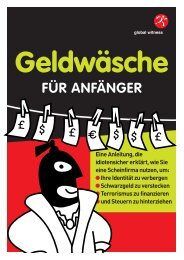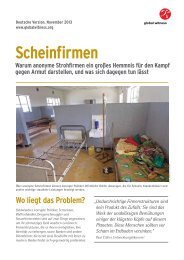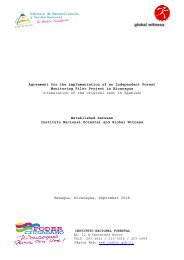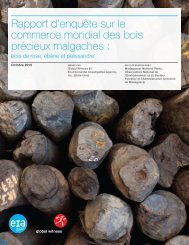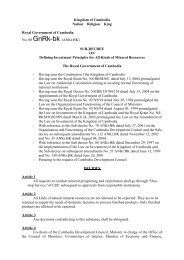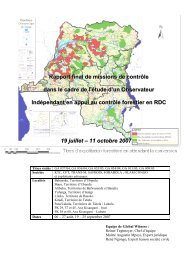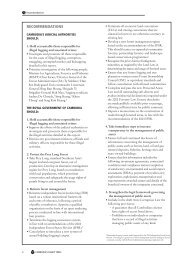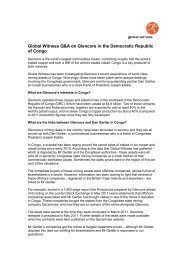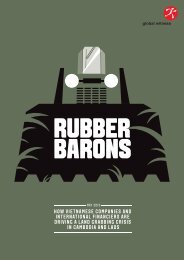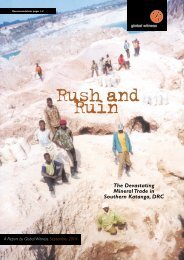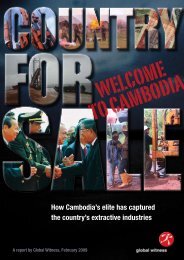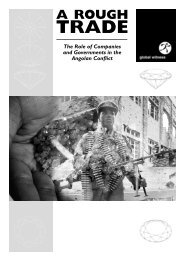03sep3 Conflict of Interests 60-89.pdf - Global Witness
03sep3 Conflict of Interests 60-89.pdf - Global Witness
03sep3 Conflict of Interests 60-89.pdf - Global Witness
You also want an ePaper? Increase the reach of your titles
YUMPU automatically turns print PDFs into web optimized ePapers that Google loves.
Part Two: Logging in Burma / 18 Karen State<br />
control, were captured by the DKBA/SLORC during<br />
their mid 1990s <strong>of</strong>fensives. The DKBA also inherited<br />
stockpiles <strong>of</strong> logs left in the forest, and in KNU camps<br />
such as Kawmoorah and Mannerplaw.<br />
The DKBA also has nominal control over areas in<br />
Karen State, and logging operations on the border and<br />
further inland. Timber from the DKBA-controlled<br />
forests is exported to Thailand as well as via Burmese<br />
merchants into Burma and from there on to the<br />
international market. Much <strong>of</strong> the timber produced for<br />
direct export to Thailand is in processed or semiprocessed<br />
form and enters via Tak Province (see page 64).<br />
Logging in parts <strong>of</strong> Pa’an and Northern Dooplaya<br />
(opposite Tak province) reflects a potent mix <strong>of</strong> unchecked<br />
Thai logging interests and the short-term opportunism <strong>of</strong><br />
the groups who participate. Most <strong>of</strong> the timber is exported<br />
to Thailand, rather than Burma, where pr<strong>of</strong>it margins are<br />
greatest. Many think that this particular area will become<br />
exhausted within the next few years and there is already a<br />
shortage <strong>of</strong> suitable leaves for ro<strong>of</strong>ing houses as teak and<br />
dipterocarps are becoming increasingly scarce.<br />
According to a KNU <strong>of</strong>ficer interviewed by <strong>Global</strong><br />
<strong>Witness</strong>, in the last six years huge areas <strong>of</strong> forest have<br />
been seriously degraded between the Moei River and<br />
the Dawna mountain range. Most <strong>of</strong> the remaining<br />
good forest is in the mountainous areas and, since the<br />
current Thai government under Prime Minister<br />
Thaksin Shinawatra came to power, there has been<br />
renewed pressure from Thai logging companies to open<br />
up these areas. The area controlled by the KNU’s 7th<br />
Brigade, in Pa’an District, is mentioned in particular. 294<br />
According to a DKBA defector from 999 Brigade<br />
there are ‘hundreds’ <strong>of</strong> sawmills in Myawaddy District,<br />
mostly operated by Thais with many employing Thai<br />
workers. 294 In the defector’s previous area <strong>of</strong> operation<br />
Thai businessmen initially negotiate with the DKBA<br />
leadership for logging concessions, after which they deal<br />
with the local units where their concessions are located.<br />
Sawmills owners are reported to pay the DKBA 10,000<br />
baht ($222) each month and 300 baht ($7) for each day<br />
and 300 baht ($7) aa for each night worked. The fact these<br />
sawmills are run 24 hours a day has been confirmed by<br />
villagers from Wa Le Town, Phop Phra District in Tak,<br />
just a short distance from Burma across the Moei River.<br />
The defector claimed that when Burmese Forest<br />
Department Officials visited DKBA-controlled areas<br />
and ordered the DKBA to close sawmills, the requests<br />
were ignored. 293 It is thought that overall permission for<br />
the logging comes from the SPDC even though the<br />
Forest Department may have little control over specific<br />
operations and it is thought that there have been no<br />
<strong>of</strong>ficial agreements. <strong>Global</strong> <strong>Witness</strong> has been told that<br />
the deals are struck at regional command level, in this<br />
instance the S. E. Regional Command, but this has not<br />
been confirmed. 293 Taxes are said to be shared between<br />
the Regional Command and the Military Intelligence. 293<br />
aa $1 = 45 baht in 2001.<br />
77<br />
A CONFLICT OF INTERESTS<br />
Some DKBA combatants work for the logging<br />
companies providing labour and security. As the area is still<br />
contested it is probable that DKBA security would protect<br />
the sawmills from KNU combatants demanding taxes.<br />
In May 2003 it was reported in the media that a<br />
Buddhist leader and a colonel from DKBA Battalion<br />
No. 906 were involved in cutting teak near the Three<br />
Pagodas Pass border town. According to the news<br />
agency’s source the DKBA sold 17 tons <strong>of</strong> teak in April<br />
2003 at a price <strong>of</strong> 18,000 baht ($430) per ton. Some <strong>of</strong><br />
the teak is sold to local traders, made into furniture and<br />
exported to Thailand. 296<br />
18.4.4.1 The DKBA and logging in Karen State away<br />
from the border<br />
Although logging is heaviest near the border, the DKBA<br />
is also involved further into Burma where it deals<br />
directly with timber merchants and larger companies<br />
such as the Htoo Company. These companies have<br />
logging concessions granted either by the central<br />
government or by the S.E. Command, possibly both.<br />
Many DKBA-controlled areas are still actively contested<br />
by the KNU, and are deemed to be insecure zones.<br />
When a logging concession is granted in an insecure<br />
zone the DKBA arranges for the timber to be cut and<br />
transports it to ‘handing over points’ where it is passed<br />
to the company that has the logging concession. 292<br />
Timber from these concessions enters the Burmese<br />
timber market via the MTE and private timber<br />
merchants. The DKBA is reportedly paid 10,000 kyat<br />
($16) per ton <strong>of</strong> timber <strong>of</strong>ficially extracted from their<br />
areas, which appears to be an agreement between the<br />
DKBA and the SPDC. 292<br />
As with other ceasefire groups that are given<br />
permission to log for development or maintenance<br />
purposes, the DKBA has a 5,000-ton logging allowance<br />
per year for the upkeep <strong>of</strong> Myaing Gyi Ngu, the DKBA<br />
headquarters. 292 The Buddhist monk, U Khay Mi Ka, is<br />
responsible for dealing with the DKBA’s <strong>of</strong>ficial timber<br />
income. It is not certain if the 10,000 kyat payment, per<br />
ton mentioned above is limited to this 5,000-ton<br />
allowance that the DKBA has been given.<br />
The DKBA derives further income by logging<br />
un<strong>of</strong>ficially, for instance with SPDC army units or by<br />
charging private individuals who want to build sawmills<br />
on the edge <strong>of</strong> insecure zones where logging is<br />
conducted. 292 This is said to be particularly pr<strong>of</strong>itable<br />
for the local DKBA and SPDC units as most <strong>of</strong> the<br />
money is retained instead <strong>of</strong> being passed to higher<br />
127, 292<br />
levels <strong>of</strong> command.<br />
The DKBA and individual DKBA <strong>of</strong>ficers own<br />
sawmills and furniture factories in Kawkareik and Myaing<br />
Gyi Ngu where the DKBA also has a timber jetty on the<br />
river. The DKBA sells teak to traders who come up from<br />
Moulmein. Timber traders also use the DKBA to transport<br />
illegal timber to Rangoon to avoid checkpoints. 292



